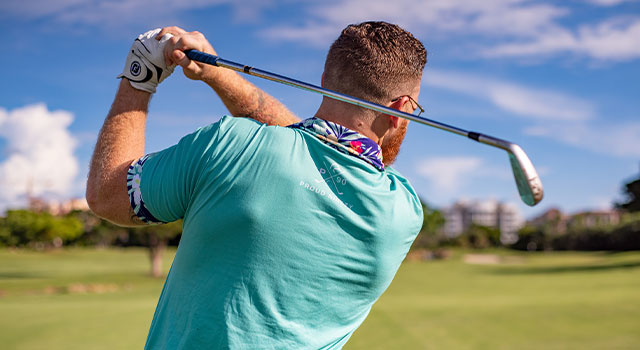 Golf is a very visual sport, so if your visual skills are subpar, it will hurt your golf game. Sports vision training — individually prescribed exercises that develop specific visual skills and processing in athletes — can improve your game. Such training can be done off the course to hone putting, which is one of the most demanding strokes.
Golf is a very visual sport, so if your visual skills are subpar, it will hurt your golf game. Sports vision training — individually prescribed exercises that develop specific visual skills and processing in athletes — can improve your game. Such training can be done off the course to hone putting, which is one of the most demanding strokes.
Putting, hitting a golf ball with a light stroke, requires intense concentration, calm under pressure, and a superb ability to read the greens: to understand how the closely-cropped grass near the hole will accelerate or slow, divert or escort a softly struck golf ball. Putting also demands knowing how far the ball must travel and precisely where on the club the ball should be tapped (the “sweet spot”).
Unfortunately, even golfers with 20/20 vision won’t succeed if their eyes don’t work in unison, or if they have poor eye-hand-body coordination. That’s where sports vision training comes into play.
Becoming a Tiger Woods or Jack Nicklaus is a tall order, but whether you’re a professional or an amateur golfer, sports vision training can make you a better golfer.
Improve Putting By Training Your Visual Skills
First and foremost, Dr. Joshua Watt of Impact Vision Therapy will test your visual skills using a functional eye exam. This will include evaluating your hand-eye coordination, eye tracking, eye teaming (how the eyes work together), peripheral vision and ability to discern contrasts between colors. Dr. Joshua Watt will then prescribe a tailored program for your needs that will include in-office and at-home exercises in order to strengthen each skill.
How Can Sports Vision Training Improve Your Putting?
Customized sports vision training can help golfers:
- Analyze the ball’s location in relation to the hole
- Position the club so that its sweet spot lines up with the ball
- Conceive a strategy for hitting the ball to account for the distance, the greens, even the wind
- Convert that strategy into action with the club that delivers the ball into the hole
On a practical level, once golfers line up on the green to putt, they engage in a prolonged routine that’s almost never seen elsewhere on the course. Because they need to keep focusing on a close-by object and then shift their focus to the targeted destination, they repeatedly look back and forth between the ball at their feet and the hole.
This is known as focus flexibility, a technique that can be practiced at home by focusing on the floor tile near your toe, then on a dog-food dish (or other objects) located 15 feet away, then back on the tile, and so on. To practice depth perception, move from spot to spot and estimate each distance from the closest tile to the dog-food dish. To improve peripheral vision, focus on the tile while simultaneously attempting (and without changing the position of your head) to see the dog-food dish.
Visual Skills + Imagining Great Outcomes = Visualization
Sports vision training also involves a technique known as visualization, which is applicable to sports and to all areas of life. It involves closing your eyes and envisioning yourself taking each step necessary to execute a perfect putt. When you line up a putt in real life, those images will come to mind, ready to be applied step by step to attain success: sinking the putt.
Dr. Joshua Watt will develop a customized sports vision training plan to improve your putting and overall golf performance. Impact Vision Therapy assists people just like you, from Pueblo, Colorado Springs, Castle Pines, Parker and throughout Colorado.
References
- https://www.allaboutvision.com/sportsvision/skills.htm
- https://www.allaboutvision.com/sportsvision/treatment.htm
- https://www.aoa.org/optometrists/tools-and-resources/sports-and-performance-vision/visual-performance-assessment-and-training
- https://www.aoa.org/optometrists/tools-and-resources/sports-and-performance-vision
- https://www.aoa.org/optometrists/tools-and-resources/sports-and-performance-vision/spv-evaluations-and-comprehensive-eye-exams
